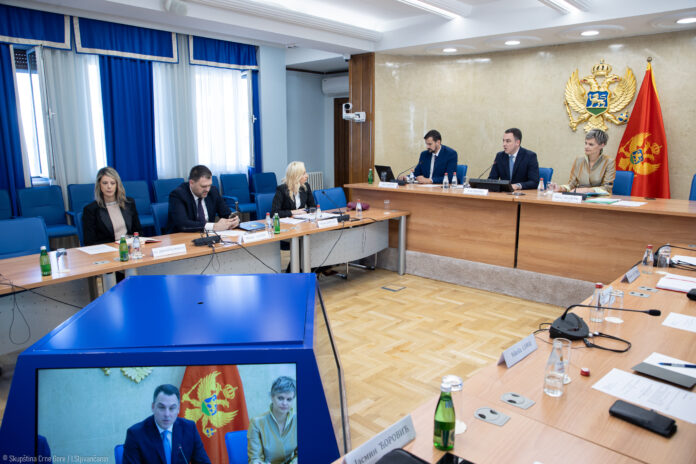Minister of European Affairs Maida Gorčević updated the members of the European Integration Committee today on the current state of Montenegro’s negotiation process and the dynamics of closing negotiation chapters. She also presented quarterly and semi-annual reports on activities within Montenegro’s EU integration process and addressed questions regarding the implementation of recommendations adopted at the 11th meeting of the Parliamentary Stabilization and Association Committee (PSAC).
The Committee adopted the 40th, 41st, and 42nd Quarterly Reports, covering the period from December of last year to June of this year, as well as the 20th and 21st Semi-Annual Reports on overall activities within Montenegro’s EU integration process, covering the period from July of last year to June of this year.
Minister Gorčević noted exceptional progress in European integration, emphasizing that obtaining a positive IBAR (Interim Benchmark Assessment Report) was one of the most significant breakthroughs, bringing renewed enthusiasm to the process.
“I believe this has been a successful year for European integration. Obtaining the IBAR has truly unlocked Montenegro’s European path. We have fostered excellent cooperation between the Government, Parliament, and domestic stakeholders, as well as strong regional collaboration, particularly with European partners,” she stated, underlining the importance of achieving societal consensus on European integration across all three branches of government.
In this context, she highlighted the planned closure of four chapters after seven years of stagnation as a major achievement. She expressed confidence that these chapters would be officially closed at the Intergovernmental Conference in December, positioning Montenegro as a de facto leader in European integration.
The Minister reviewed the activities carried out during the reporting period from July 2023 to June 2024, informing Committee members about key steps and progress in each chapter. She concluded that advancements had been made in every area. She also presented the implementation status of Montenegro’s EU Accession Program for the reporting period, outlined future plans with a focus on closing chapters, and reiterated the Government’s goal to finalize the negotiation process by 2028.
She noted that Montenegro is in the process of drafting a new EU Accession Program for the next two years.
“We will establish new timelines for chapter closures, which will be communicated with both the relevant departments and the European Commission,” Gorčević said.
She added that 326 obligations are planned for the current year. Last year, 98 out of 300 obligations were fulfilled, and this year, 50 out of 102 have been completed to date.
Discussing the revised plan to close ten chapters by December, Gorčević explained that the process does not depend solely on Montenegro but is also influenced by objective technical factors, including changes within the European Commission’s administration and the European Parliament elections. These developments, she said, have slowed communication with both Montenegro and EU member states. She announced plans to close all chapters by 2026, with two additional chapters to be internally closed by the end of this year, alongside the formal closure of four chapters.
“We have a clear picture of when specific chapters need to be closed. This is why the PPCG (Montenegro’s EU Accession Program) is being adjusted to reflect changes in obligations and priorities. For a chapter to be closed, all final benchmarks must be submitted to the European Commission four months in advance.”
She emphasized that the Government remains committed to its goals regarding the pace of chapter closures and that European integration remains a priority. This is evidenced by the approval of the Reform Agenda and recent initiatives, such as training civil servants to work in European institutions and increasing youth involvement in the process through EU debates in high schools and internship opportunities at the Ministry of European Affairs.
Addressing the obligation to elect a Supreme Court judge as part of the Reform Agenda, Gorčević stressed that this responsibility lies with the Government, Parliament, and judiciary alike. She expressed confidence in achieving societal consensus on this critical issue.
On the subject of the IBAR, she described it as the result of streamlined procedures, the collective work of the Government and Parliament, and strong communication with the European Commission. She clarified that this report does not close Chapters 23 and 24 but confirms that Montenegro has met the minimum rule-of-law standards required in EU member states.
As a clear indicator of Brussels’ political will, Gorčević pointed to the announced visit of Ursula von der Leyen and the appointment of Marjan Šarec as Rapporteur for Montenegro, recognizing Slovenia’s support for Montenegro’s EU integration and its advocacy for the Western Balkans’ enlargement.
“Intergovernmental conferences in January, June, and the one scheduled for December are the best indicators of the EU’s stance toward Montenegro and our European path, encouraging us to continue as we have so far,” she concluded.
The Minister announced that the Progress Report is expected on October 30, expressing confidence that it will highlight advancements in the chapters.


